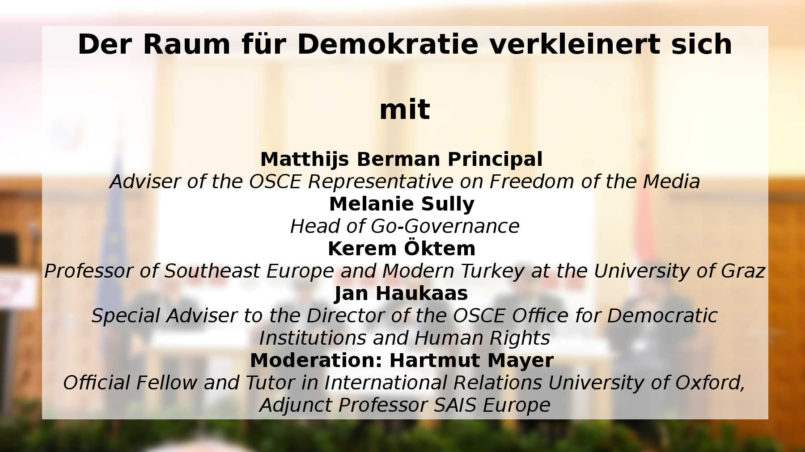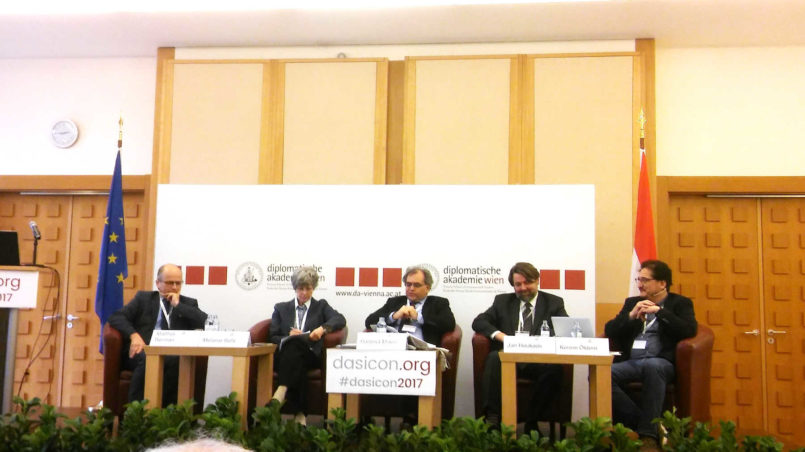Shrinking Democratic Space

In the course of the third panel of this year’s DASICON, the participants discussed the dangers for western democracy.
According to Melanie Sully, today we have more democracy and transparency than ever before. The fact that these terms are appearing with greater frequency in the media is an indication of increased attentiveness. In Great Britain, discussions are underway regarding electronic votes – a topic which, whether due to the possibility for error and manipulation, above all in the technology-oriented community, is not exactly popular in the German-speaking world.
Some OSCE members (e.g. Turkey) have problems with democracy, which is why the organisation is the correct forum to discuss this as these countries (insofar as they attach importance to this) risk losing their positive image if they step too far out of line.
In order to face the smouldering and active conflicts, the youth of the countries concerned should be more actively involved and invited to do so.
A basic concept should be created for democracy – a concept which can be adjusted by global regions with diverse histories and cultures to their circumstances. The western democracy export has only been successful to a very limited extent. The greatest challenge is, however, not a political one: for ten years there has not been any economic improvement of their individual situation. This is a problem which requires an urgent solution.

The Estonian, Matthijs Berman, a reporter for many years in conflict regions and for ten years a member of the European Parliament, observes that citizens are becoming increasingly autonomous from established politics. Worldwide there is more democracy than in the last twenty to thirty years, for example in Columbia, Myanmar or in Gambia. In the course of mass surveillance, the protection of information sources – essential for journalists – has increasingly come under pressure: freedom versus safety in times of terror.
Berman has noticed dangerous new coalitions in many countries. It cannot be a point of discussion whether people are allowed to elect their government: this right has to be granted at all times; citizens demand a true democracy.
Human rights are the focus of Jan Haukaas’ activities at the OSCE. The Copenhagen Criteria, adopted by the EU in 1993, were recognised by the majority of European countries within two years. The election supervisory authority, the ODIHR, does good work but it is politically anchored with no legal right to intervene in the case of violations. Until 2005 human rights’ standards were constantly being improved but since then setbacks have been recognised and the approval for previously undisputed standards has waned. Civil society today has less space than prior to 2005.
Haukaas considers four trends to be decisive for the current situation:
- The further a country is located from conflicts, the less respect there is for democracy. People have apparently lost the ability to appreciate democracy.
- Connected to this is a declining trust in poilitics. In some places, only 10% of the population believe that politics can solve problems. Many voters ask themselves what current politics has done for them personally – if at all.
- The perception of corruption has changed: today there are many possibilities to uncover corruption. Due to the subjective perception that there are an increasing number of cases of corruption, trust is declining.
- The media revolution has completely changed public discussions. Nowadays everyone has coverage and finds like-minded people. For example, if you read the comments on the internet websites of Norwegian newspapers, you would think that the reader lives in a Failed State.
In order to solve these problems, the OSCE has to break out of its own bubble of opinions and political institutions have to once again (learn to) communicate better. The youth have to be involved in such a way that they consider correct. In the course of the annually held human dimension implementation meetings, many events are planned, to which young people from all over Europe are invited in order to present their points of view. Further there are programmes for the Western Balkans, in particular for Sinti and Roma, in which Change Agents will be used.
Since the end of the Cold War, democracy has been the only sucessful political model, according to Prof. Kerem Öktem. It has also been introduced in Russia and Turkey but there it is currently under attack. The members of the OSCE currently cover all models, from democracy to dictatorship. Öktem asks why there were no initiatives taken on the part of the OSCE to counter the dismantling of democracy both before and in the course of the referendum in Turkey. It is legitimate to avert an attempted coup but to dismiss thousands of academics because they signed a peace petition was definitely not the correct measure.
On the question of the four vacant posts in the executive committees of the OSCE (note: this was resolved a few days ago), the panel stated that it is difficult to find a consensus (the unanimity principle prevails). Dunja Mijatović‘s position as the officer for press freedom has been extended by one year as no agreement could be reached on a replacement.
A joint conclusion of the panel: in today’s world, the individual has become more autonomous; supported by social media, the individual is less dependent on daily politics and classical media. Democracy has to adjust to this change but this is only happening slowly. Politics has to face the fact that the “top-down” approach no longer works but rather that people live and create democracy together.
Translation into English: Donna Stockenhuber
Credits
| Image | Title | Author | License |
|---|---|---|---|
| Dasicon 2017 | Christian Janisch | CC BY-SA 4.0 | |
| Dasicon 2017 – banner | Christian Janisch | CC BY-SA 4.0 |
